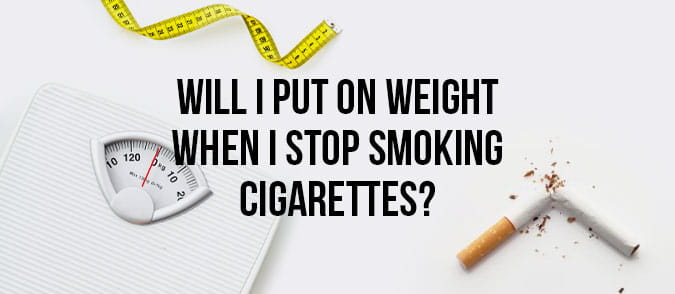
There isn’t a yes or no answer to whether you will gain weight while quitting smoking. It all depends on the habits you pick up while transitioning. In this blog we will take a look at some of the causes of weight gain when quitting. We will also provide helpful tips to avoid these and share where you can get support on your smoke free journey.
Why do You Gain Weight When Giving Up Cigarettes?
Snacking is easily one of the worst habits to fall into after stopping smoking. The simple hand to mouth movement closely resembles smoking a cigarette. Plus, eating a tasty snack is very satisfying. The problem is that eating too much will lead to putting on weight, especially unhealthy food. Other reasons for resorting to snacking including:
·Smoking can increase your metabolism so when you quit your body doesn’t burn calories as quick.
·Smoking also supresses your appetite so you will find yourself hungrier after quitting.
·Nicotine cravings can also be mistaken for being hungry.
·Most people find food taste better after quitting and start to crave sugary foods.
How to Avoid Weight Gain
A quick fix is to try snacking on low calorie veg such as celery. Even though it wont taste anywhere near as good as crisps or chocolate the process of picking it up and eating will go someway to distracting you from the habit.
Having a good balance of exercise and calorie intake is also a way of managing an weight gain. The average adult male should intake 2500 calories a day whereas a female for have 2000. If you can calculate your calorie intake over the day and balance it with a fair amount of exercise this will help to avoid weight gain. If you don’t want to calorie count all day just try to maintain a balanced diet and exercise regularly. Personally I try to eat healthy but will have the occasional treat after a workout.
Exercise also boost metabolism so even something as simple as a short walk a day will help. Also by making your meal portions slightly smaller than normal it should help to avoid putting on weight while your metabolism adjusts to no longer smoking.
As well as being physically beneficial exercise can also help your mental heath as it releases dopamine to the brain. This can help if you are stressed or suffering from depression. Read our blog about mental health and smoking to learn more about how to deal with stress and other issues when quitting.
Do not go cold turkey. Use nicotine replacement products to lower your nicotine cravings. This should help to manage your increase in appetite and stop you from going for a cigarette if a craving occurs. Nicotine patches or gum are good options but studies show that vaping is a more effective NRT. This is because the sensation is similar to smoking while still providing a nicotine hit. Nic salt e-liquid is know to be the best type to vape when quitting as it mimics the salts in tobacco to give a smoother throat hit.
Nicotine-free Vaping Replacement
Gradually lowering your nicotine needs over time is the best way to quit while avoiding weight gain. E-liquid comes in a range of strengths to suit almost any smoker from heavy to casual. Once you find the right strength you can then begin to lower it as you require less nicotine. There is no set time for when to start lowering the strength but most NRTs suggest 12 weeks.
